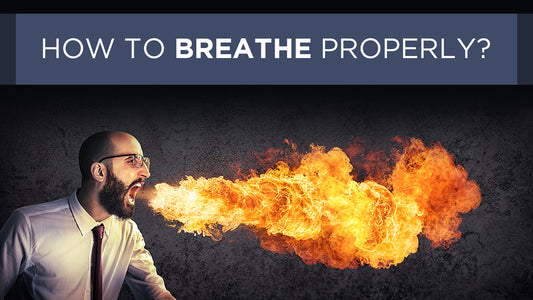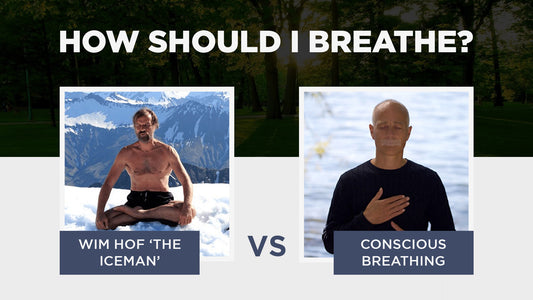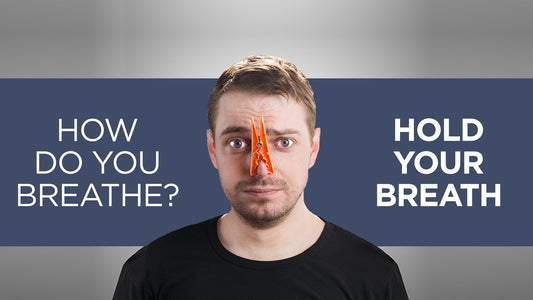
Can Breath Training cause a “cleansing reaction”?
Some people who do breath training may experience a cleansing reaction before their symptoms begin to improve. This process, which might be experienced as a temporary aggravation of symptoms, could happen immediately or after a few weeks of breath training. What happens when we get an initial aggravation is similar to what happens when a person quits smoking. The new non-smoker may not feel well at first, and it may take a while before the physical benefits are experienced.
Another example would be when a person experiences a tough time when trying to wean off of antidepressant medications. In these cases we call it withdrawal symptoms. Usually the reaction occurs where we have had problems before. A way of looking at a cleansing reaction is therefore that our body is in fact in a healing process.
If you have been a smoker you might initially cough more when you begin breath training and your body is starting to heal, or if you’ve had a constantly blocked nose for a long time, the blockage issue might temporarily seem worse before it gets better. In general, you can say that when you change your breathing habits to low, slow, and rhythmich breathing, your cells get more oxygen and they can then produce more energy and get hold of tasks they haven’t had the power or energy to take care of before.
We push too hard
Our society is characterized by a performance mentality where it is cool to have a busy schedule or have aches and pains after yesterday’s workout. This, in combination with a shortsighted quarterly economy mindset, meaning that the results should preferably show up almost before we have even started, contributes to a tendency to push ourselves too hard.
If you approach breath training with this same mindset, thinking, “Well, it is just some breath training, so it shouldn’t cause much of a reaction,” you may go ‘all in’ and take it on at full speed. Anything you do too much, too fast, can cause a backlash, just like trying to run a marathon without training and building strength first. Too much breath training, too fast, can cause a cleansing reaction.
There is no judgment in the above. It is more of an observation that many of us operate in this way. As humans it is in our nature to challenge ourselves and test the limits of what we are capable of. When I started doing breath training for the first time in 2008 I did it exactly in this way. I gave it all I had and wanted to achieve “the worlds best breathing” in the shortest possible time".
Did I succeed? Well, I got a severe cold which lasted five weeks. I don’t recall ever having such a cold before. It made me loose interest in doing breath training for quite a while. Soon enough I was back on track, this time with a more relaxed attitude, and I have been hooked ever since.
Take it easy if your health status is poor
One reason why we can have a cleansing reaction when doing breath training is simply that we are not feeling well. Our body is in a state of imbalance. In general the following applies – the poorer your health, the more careful you have to be when doing breath training if you want to avoid cleansing reactions. The best strategy is to see yourself as a beginner, similarly to how you would approach doing push-ups if you haven’t done a single push-up in your entire life.
If you start doing 100 push-ups the first day, you may experience that it is so tough it will take you many months before you are ready to try a second time. Success, no matter what, is rarely the result of one quick, giant leap, but instead is the result of many, many small steps taken over a longer period of time. Another key is to lower your expectations, as high expectations usually means low stamina and endurance meaning we give up quicker.
Response to breath training is highly individual
You might experience a cleansing reaction when you begin breath training, OR you have no cleansing reaction at all. If you start to feel worse I suggest you choose an alternative below that suits you best. There is no right or wrong:
- Continue as you’ve done until now and keep hanging in there with the breath training.
- Continue to do breath training, but not as much as before.
- Increase your breath training activities in order to get rid of the inconvenience faster.
- Take a complete break from the breath training for a few days, especially if the cleansing reaction becomes too troublesome.
It is also important to take into consideration that a learning curve is never a straight journey. It goes in steps and notches. Sometimes it levels out and we find ourselves on a plateau before moving on to the next level. For example, some people start to tape their mouth at night and get a very positive effect during the first few weeks before it levels out.
The fact that mouth taping contributed to the positive effect during this period indicates that the breathing pattern has room for improvement during daytime as well. The way we breathe at night is also the way we breathe during the daytime. So taping your mouth at night is just a first step towards better breathing habits.
A natural next step is to start doing breath training during the day—for example, training with the Relaxator, doing low-intensity physical activity with your mouth closed, and becoming more aware of how you are breathing in different situations so that you can start to improve your habits.
Perceptions about learning

Actual learning curve

Some experiences
1. SINUS INFLAMMATION DISAPPEARED

– After two weeks of Conscious Breathing Training I got a cleansing reaction, a hefty sinus inflammation. I have had problems with chronic sinusitis on and off for many years, but not as hefty as this, for at least 6-7 years.
It was my body that got rid of old trash and I haven’t had sinusitis ever since, which is now more than two years ago. Read more >>
– Therese Karlsson
2. I GET A HEADACHE
– I get a headache when I do physical activity with closed mouth and when I use the Relaxator on a high resistance setting (which makes it hard to exhale).
ANSWER Anders Olsson: The headache usually occurs in the frontal lobe and the most likely reason is that the pressure in the nasal and sinus cavities increases. Another reason for the headache is that carbon dioxide makes the blood vessels open up so that more blood is delivered to the brain. If the blood flow to the brain increases too fast, it may lead to headache. The headache is usually transient and lessens and disappears as the body gets used to the new way of breathing.
It usually also disappears if you a) reduce the intensity during your workout, b) reduce the prolonged exhalation so that the pressure in the sinuses is reduced, and c) reduce the resistance on the Relaxator so it becomes easier to exhale through it.
3. I GET A SORE THROAT
– After using the tape I’ve gotten a sore throat and also need to clear my throat, as if there is some mucus stuck there. When I put the tape on, before I fall asleep, I also need to swallow. I am pretty sure that it is not an infection or a cold. Instead, I believe that it could be attributed to my changed breathing at night because of the tape. Could this be the case?
ANSWER Anders Olsson: What you experience could definitely have to do with taping your mouth at night. Exactly what is going on is hard to say. After all, we are quite complex beings. Some people get reactions, initial aggravations, when they start to do breath training, even though most don’t.
Usually the reaction occurs where we have had problems before. Is it correct that you’ve experienced similar problems before? In general, one can say that when we calm down our breathing habits we improve cellular oxygenation and in turn the cells can then produce more energy and get hold of tasks they haven’t had the power or energy to take care of before.
Reply from the enquirer: – Thanks for your answer. It was interesting to learn that a reaction could occur where you’ve had problems before, because I have hypothyroidism, underactive thyroid disease, and have taken medication for it since it was discovered three years ago. My thyroid is also slightly enlarged and inflamed, or at least it was at the time of the discovery. So now I better understand how my current reactions in the throat are closely connected to my history of hypothyroidism. Thanks!
4. I WOKE UP IN A PANIC AND DON’T DARE TO TAPE ANY LONGER
– I have taped my mouth for a few weeks and have slept so well! But then, one night I woke up in a panic! I was almost breathless, and my heart almost stopped. I had stopped breathing with my nose and my mouth was taped. Why did this happen, do you think? I don’t dare to sleep with my mouth taped any longer.
ANSWER Anders Olsson: Really great that you slept so well with your mouth taped, but the night you woke up in panic doesn’t sound like a particularly nice experience! It is hard to say what happened. Have you had problems with your health/panic/worry/heart before?
Maybe it was a reaction to a stressful period in your life? Maybe it was a reaction to something you have suppressed that came to the surface?
I understand that it must have felt scary when your mouth was taped. IF you dare to try again I recommend that you tape your mouth during the evenings for a while to get used to the tape again. And if you decide to try at night again, I would tear the Sleep Tape in half and tape from your nose to your chin, so that you quickly and easily could remove the tape if needed.
Reply from the enquirer: – Yes you are probably right about the anxiety. I am taping my mouth again and have done so the whole week and I haven’t woken up with anxiety a single night. I also try to have my mouth closed and breathe with my stomach when I’m awake. Feel much better now.






